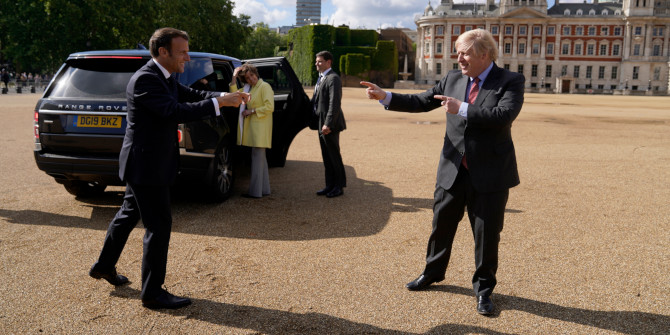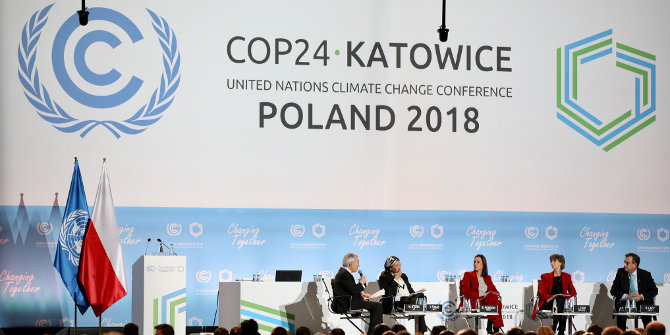In GDP terms, the Russian economy is much smaller than that of the EU, yet from a political and military perspective, Russia is a major player in global affairs. Paul De Grauwe argues that Europe grants Russia this power by leaving defence as a matter for each of its constituent nations, instead of having a combined army.
A few days ago I saw a surprising statistic: the GDP of Russia is of the same order of magnitude as the combined GDP of Belgium and the Netherlands. In 2017 Russian GDP was 1,469 billion dollars (according to the International Monetary Fund). Belgium had a GDP of 491 billion dollars and the Netherlands 824 billion dollars; together $ 1,315 billion. In GDP terms, Russia is only 12 per cent larger than Belgium plus the Netherlands.
This perplexing statistic prompted me to ask why politically Russia weighs so much more in the world than Belgium and the Netherlands, while economically that country is hardly stronger than these two countries bordering the North Sea.
Before answering that question, first some other figures that illustrate how much of an economic lightweight Russia is. US GDP reached US$ 19 362 billion in 2017. With GDP as a yardstick, the US is 13 times bigger than Russia. In the same way, other countries can be compared with Russia. China is economically 8 times larger than Russia; Germany 2.5 times more, France 1.8 more, and the European Union as a whole is 12 times bigger than Russia.
The economic size of a country is one of the most important factors that determine its military and political importance in the world. A large economy is needed to provide the means that gives the country military and political weight in the world. So it is clear: Russia is boxing above its economic weight on the international scene.
The fact that Russia means so little economically implies that the country must exert extraordinary efforts to create a strong military potential. In 2017, Russian military spending amounted to 61 billion dollars (according to the International Institute of Strategic Studies). The US spent nearly 10 times more, namely $ 603 billion. China spent $ 151 billion on defence. France and Germany together spent 90 billion dollars on defence, 50 per cent more than Russia. And yet all these countries spent a much smaller proportion of their GDP on the military than Russia.
Russia is not a major player in the field of military spending. To have a certain military weight, that country must reserve a much larger share of its GDP for defence than the other countries. To mean something militarily, Russia has to put a heavy burden on its own economy. I come back to my question: why is it that Russia, which economically is a lightweight, has such importance politically and militarily? Here is an attempt to answer that question.
First there is the fact that, at the time of the Soviet empire, Russia built up a nuclear arsenal that, together with the USA, gives this country a unique position in the world. This is the position of “Mutually Assured Destruction” (MAD). This means that the country has the capacity to completely destroy the opponent in the event of a nuclear attack on its own territory. No other nuclear power (outside the US) has that capacity today. As long as Russia has such a terrible MAD capacity, it will be politically heavier than its GDP suggests.
Russia is also an important supplier of raw materials, including oil and gas. This gives the country a political lever with regard to Western Europe. It is possible by turning the tap (or threatening to do so) to exert pressure on a number of European countries. However, that effect should not be overestimated. Russia also knows that the use of this weapon will in time encourage European countries to find other sources of supply. The power of Russia is limited in this domain because the country does not have a monopoly in oil and gas.
Finally, and this is my most important point, Russia is powerful because Europe grants that power to Russia. Europe has built up an economic union but not a defence union. The European Union is economically 12 times larger than Russia; a huge potential power. However, this economic power is not converted into military and political power because defence has remained a national matter. By merging their military capabilities, it would be possible for France and Germany to build a credible defence against Russian threats, without having to spend more. The combined military spending of such a Franco-German defence union would be 50 per cent higher than Russian military spending. Enough to offer a counterweight to a Russian dictator whose political and military ambitions in Europe remain unknown.
“Si vis pacem, para bellum” said the Romans. If you want peace, you should prepare for war. Translated to the European situation of today this means that Europe should build a credible defence union. This by itself would reduce the military and political power of Russia.
Note: This article was originally published at Paul De Grauwe’s personal blog and is reproduced with permission. The article gives the views of the author, not the position of EUROPP – European Politics and Policy or the London School of Economics. Featured image credit: greg westfall (CC BY 2.0)





1. Russia never slaved anyone in their history.
2. Russia population is not diverse.
3. You might say China is the same, but China have others who looks like them that works for less just like Mexicans in America.
4. Everyday Russia is under threat so they worry more about their land than making money.
“1. Russia never slaved anyone in their history.”
Is this a joke? There is a stain called communism in Eastern Europe’s history. You should read more.
why would we wan to reduce Russia’s power? It is not directed at us. Russia has tried over and over to win our friendship. We have rejected her offers. We have no reason to fear Russia. So, a strong Russia is fine with me.
GDP is flawed if you don’t consider PPP. So Russia’s economy equates to Germany’s PPP which is quite strong.
A decent economy with largerst natural reserves & topest military make Russia 🇷🇺 who it is on the world stage.
By that measure, India’s GDP in terms of PPP is double that of Germany and Russia. Would you ever consider India’s economy to be twice as large as Russia’s?
It is not true that Russia is economically weak. If UK was economically so strong then why did it take a Brexit?
This is something i often thought about, and i came to the same conclusion. It must be that the political will in places like Germany, UK and France, just isn’t there to send that message to russia militarily. Although the numbers of nukes in Russia is quite hefty, i did read the UK nukes alone could destroy all major russian cities and make it an inhospitable place. The human perception of large numbers being better gives russia that irritable image that it probably doesn’t deserve.
Purchasing Power Parity is the true measure of Russia’s economy. The professor misses that very important point!
Thank you for answering a troublesome question to which until now I haven’t been able to find an answer.
Well. A most interesting and important statement coming two years before Covid and 4 years before the invasion of the the Ukraine. The most important point made was of France and Germany having a unified military force, or even a European Unified Military force. Such a force would be a much greater potential threat to Russia than NATO currently is. I personally am glad this is not the case as any military build up just causes more economic destabilising and causes further fear and panic in our World markets. Putin has a Doctorate in World Economic Theory and when he overstepped the mark he knew what a world economic meltdown would cause with higher inflation, more strikes, stronger unions. NATO also knew as it overstepped the mark tens times more than Putin (over the 30 years since the collapse of the USSR) what it would get in a massive boost in arms sales and perhaps the jewel in NATOs crown – Sweden. Well, now begins a New World Order, vastly more power to OPEC and the Middle East, economic chaos for the West and with high inflation and more strike action, more power to the Unions and more power to Left Wing political ideology which is exactly what Putin wanted. Perhaps Putins Doctorate was NOT as fake as the West made it out to be.
Putin supports the political Right Wing, what should he gain with supporting the left? Also how does Putin benefits from more powerful Unions?
I think you fail to understand the history of Russia. Russia inherited the power from the USSR. For example, Russia has veto powers at the UNSC because Russia inherited this from the former Soviet Union. Russia as well inherited large inventories of nuclear weapons without which Russia will be useless and at the level of European countries like Italy based on its GDP of $1.4 Trillion. Other things that give Russia an advantage is its land area. It is the largest country in the world by land area and to make things worse, Russia has ambitions of stealing more territories from its neighbors.
So the main reason Russia is politically story despite being economically weak is the Veto powers at the United Nations as well as the large inventories of Nuclear weapons the country inherited from the former USSR.